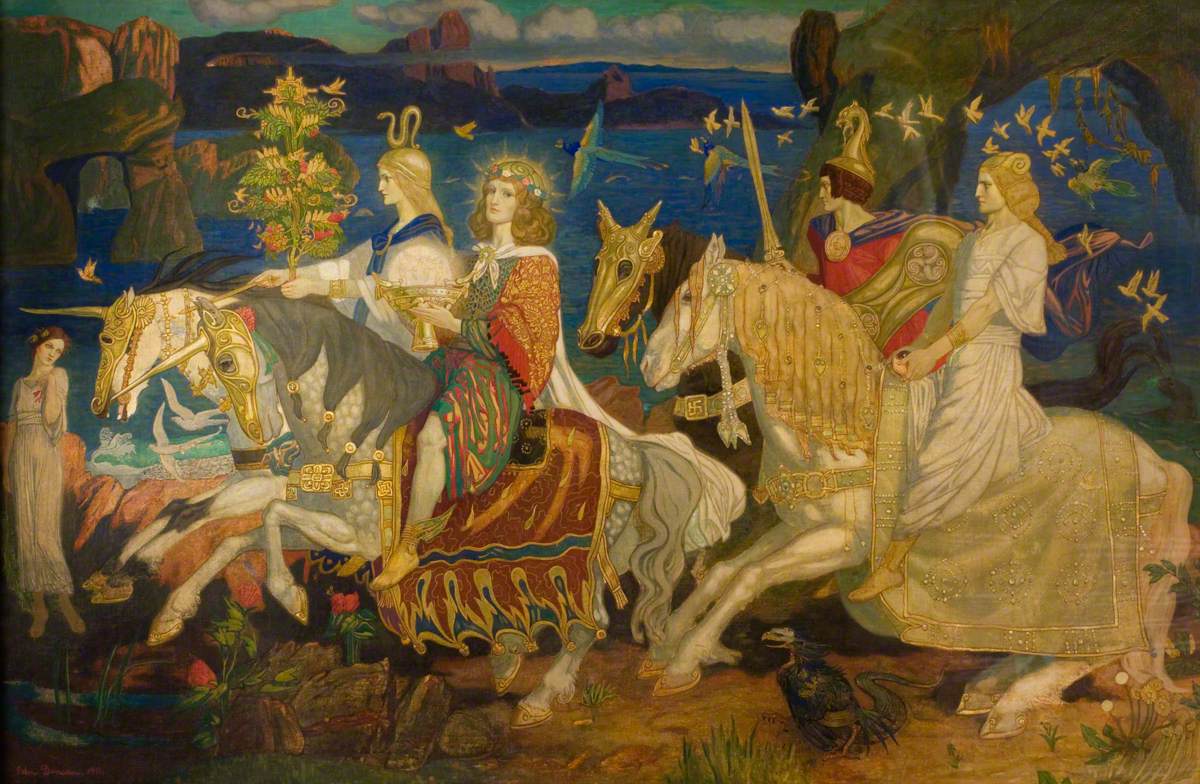Beside the World

The Sideworlders, as an extradimensional troublemaking third party, have no real analogue in the Kamen Rider equation. They are, of course, an equivalent to the aos sí, the 'people of the mounds' of medieval and early modern Irish folkloric belief and one of the main ancestors of our idea of the 'fae'. I do think, though, that they give an interesting twist to the idea that Kamen Rider repurposes a power originally created by an evil organisation to more noble ends; both of them, in this story, are reworking (crudely, but effectively) power originally created by someone else entirely, and have at best an imperfect understanding of it.
What I did have to consider was where the Sideworlders came from. In medieval Irish legend, the aos sí, under their leaders the Tuatha Dé, form part of a chain of successive "takings" of Ireland by various peoples from overseas; the Fir Bolg take it (sort of twice), then are conquered by the Tuatha Dé, who (after a failed 'taking' by the Fomori) are in turn conquered by the Milesians, that is, the Irish. Replicating all that would feel a bit odd for a story set some vague handful of centuries into the future, but I didn't want to just simplify it down to one people who lived on Mars before humans arrived and were effectively colonised; stories in which they take a malevolent role would leave a bad taste in the mouth if they were justifiably vengeful natives.
Having them arrive later solved that problem, and the dynamic of "bitter failed conquerors living in lavish but isolated palaces" is quite compelling to me. It also lets me stick to a couple of truths about Mars: one, terraforming it would be extremely difficult and isn't really in our present technological reach, because two, it's a big stupid ball of rock. No-one's native to it--and doesn't even that put paid to any attempt of colonialism to present itself as heroic? You've finally found that thing that really doesn't exist on Earth, a "truly empty frontier", and land-grabbing remains a petty, immiserating affair.
This version lets me unify a couple of cool very sci-fi concepts the Tuatha Dé have going; they live in pocket dimensions in which time and space are strange, and they first arrived out of the sky (riding on clouds, apparently). Speaking of that extremely supernatural mode of arrival: one might be tempted to ask if a path to simplifying their origin story would be to imagine an "older version"; the most complete telling of it we have is a medieval text attempting to sync up Irish and world history, the Book of Invasions, which links these takings of Ireland to Biblical events like the Flood. The fact that a number of the Tuatha Dé are figures previously worshipped as gods has led many to wonder if we can't reconstruct a "pagan version of the Book of Invasions". Unfortunately, it's not so simple; the basic framework of the story is a product of medieval literary trends and the mythological elements that are there are more little details (for instance Donn, almost certainly a deity and ruler of an afterlife, occupying a "first man to die" role here to precede that--but he's also presented as a Milesian here, not a member of the Tuatha Dé!). The nature of Insular polytheism being what it was, there probably was not a single unified idea of where the gods came from in pre-Christian Ireland; the answer would have varied depending on where and when you were. This is not to say that retellings of this story from a non-Christian standpoint can't be artistically beautiful (or indeed spiritually meaningful), but some of them don't label themselves as retellings and purport to be original, which is a common type of issue with modern writing on anything in the 'Celtic' umbrella.
Anyway, another fun thing is that naming them after their pocket dimensions also lets me put síde, the word for the Otherworldly mounds, in their name!
Get The Gordian Cycle
The Gordian Cycle
Henshin hero wasteland sci-fi in the style of a medieval Irish saga
| Status | In development |
| Category | Book |
| Author | Catia RX |
| Tags | history, LGBT, literature, Sci-fi, tokusatsu |
| Languages | English |
| Accessibility | Color-blind friendly, One button |
More posts
- How I Write These77 days ago
- Three Things that Don't Exist in This Setting88 days ago
- Story 7 is Up!91 days ago
- Quick updates to the epub filesMar 26, 2025
- Story 6 is Up!Mar 21, 2025
- I Love to Talk (With You!)Feb 26, 2025
- Plans for the Rest of the CycleFeb 18, 2025
- Feats, Tricks and Rider KicksFeb 13, 2025
- Naming Non-SchemesFeb 12, 2025
Leave a comment
Log in with itch.io to leave a comment.